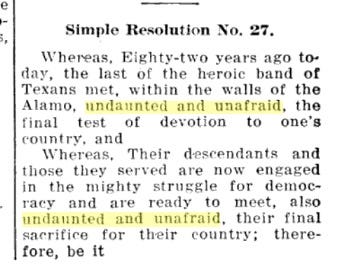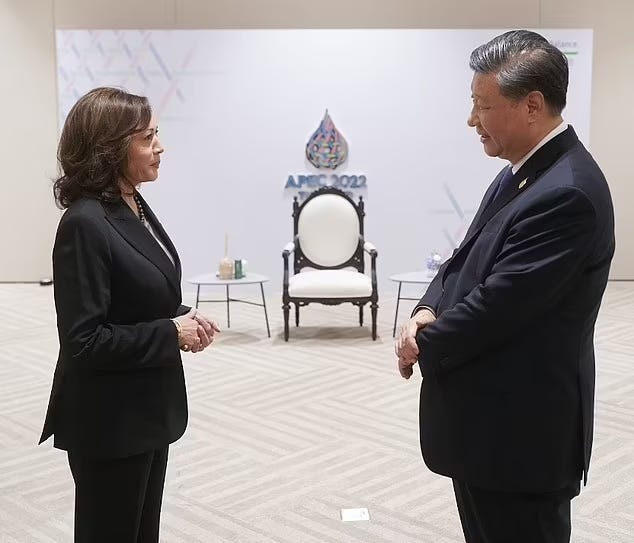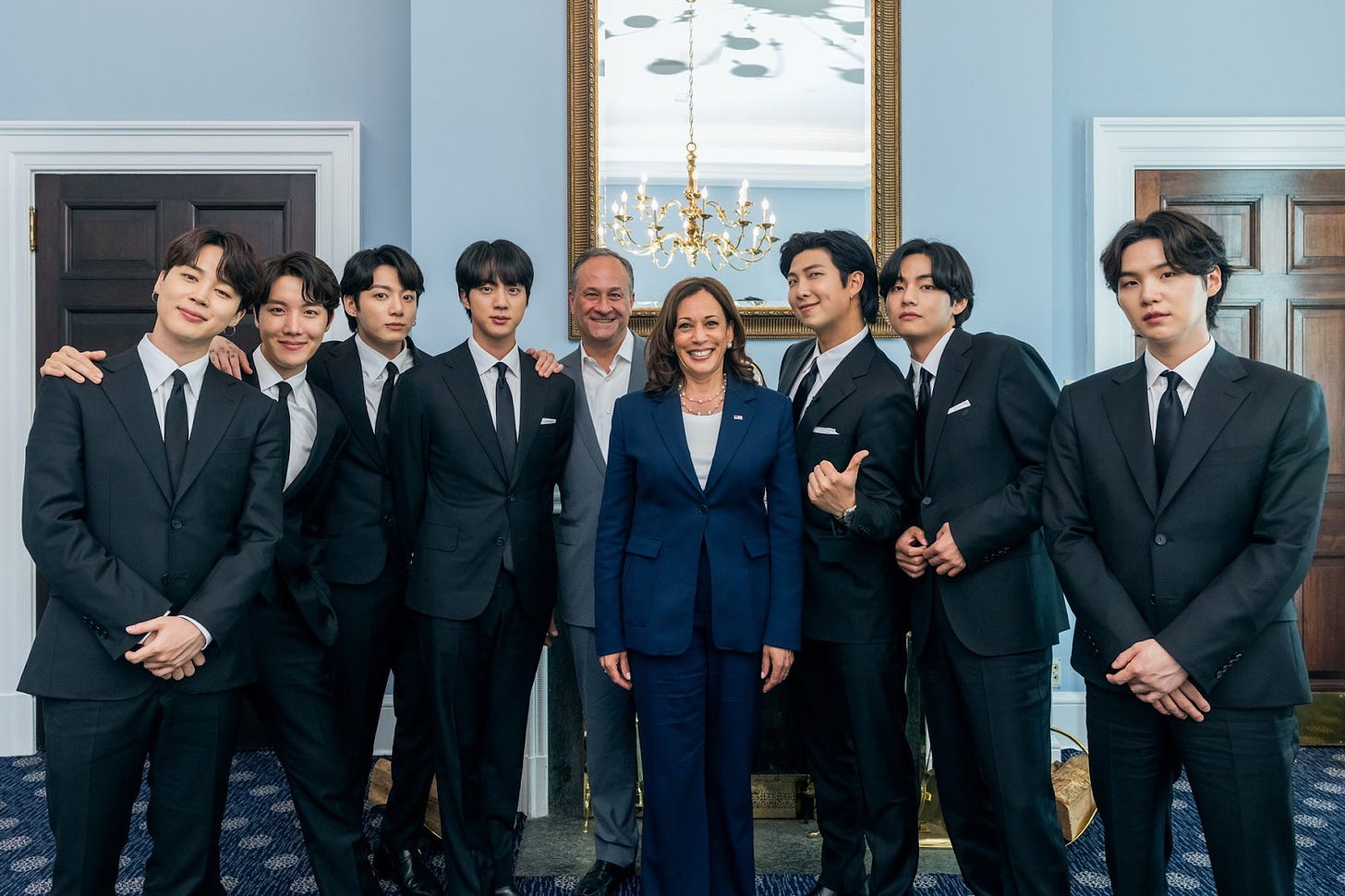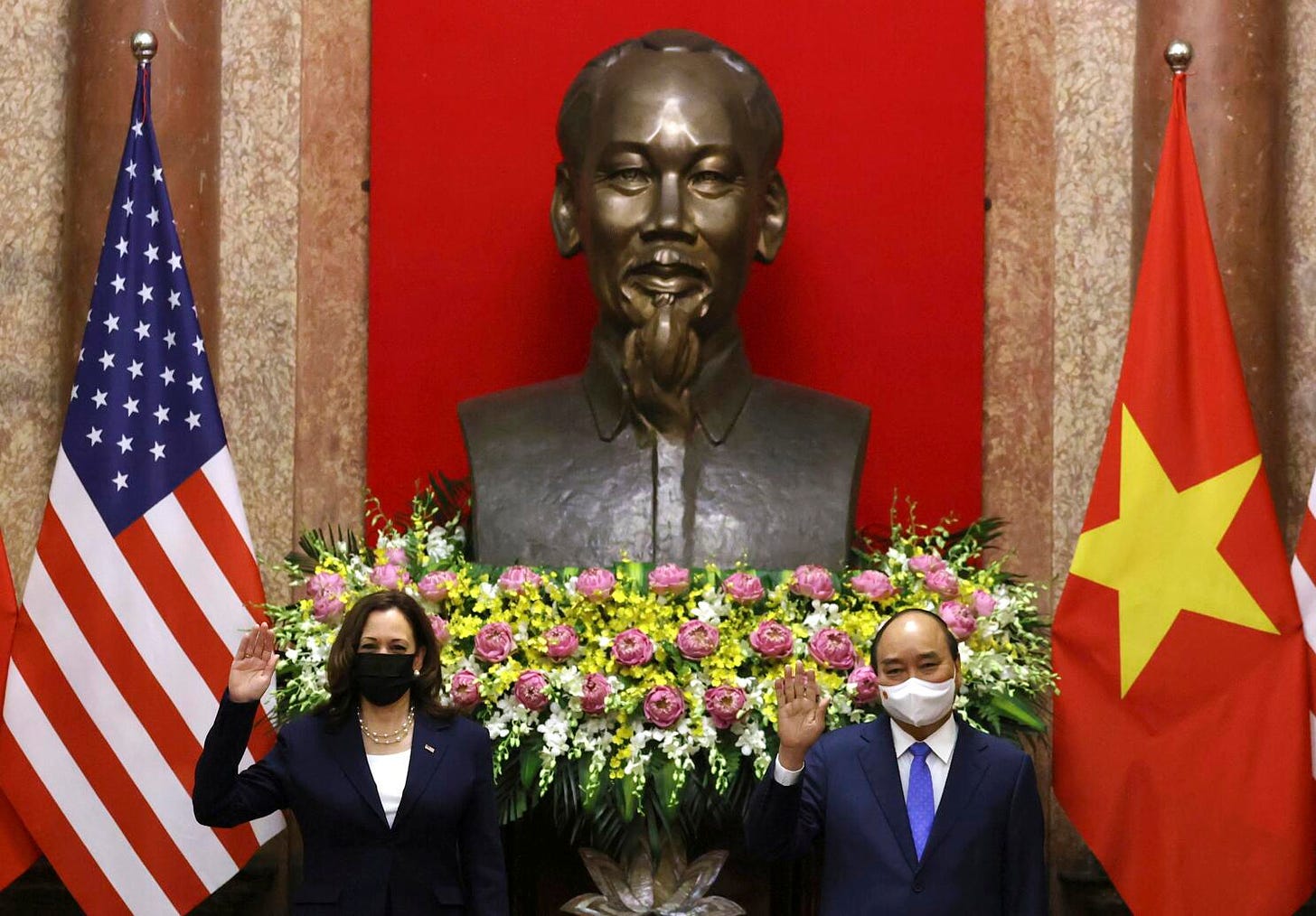Kamala on China
PredictIt has her at 15% … that’s worth some coverage of her foreign policy instincts, right?
Guest column by Nathaniel Sher, a policy analyst based in Washington, DC.
VP: Sticking to the Biden Line
According to the White House, the Vice President visited “more than 19 countries, and … [met] with more than 150 world leaders.” Can we learn much from her experience in the role?
As Vice President, Harris was vested with a high degree of foreign policy authority. Like all vice presidents since 1949, Harris was brought onto the National Security Council. The administration made it a point to give her a “crash course” on foreign policy, which early on included weekly lunches with Secretary of State Antony Blinken.
Throughout her international engagements, Harris stuck to the administration’s broader foreign policy script. The Vice President made major trips to Europe, Southeast Asia, Africa, the Pacific Islands, and the Caribbean. Similar to when Biden served as vice president, Harris attended the Munich Security Conference four times. Overall, the Vice President often brought an affirmative agenda to global engagements, focusing on the issues that US partners care about like economic development, debt relief, and climate change.
Harris delivered speeches echoing the administration’s approach on the Russia-Ukraine war, the Indo-Pacific, and the Israel-Hamas war. [Jordan: All boilerplate Biden policy, nothing we found worth a block quote…]. Alliances, multilateralism, and norms like sovereignty, democracy, and the rule of law were recurring themes throughout her speeches. Harris has appealed to her background as a prosecutor to argue for continued adherence to international rules and agreements.
While Harris’s trips overseas aimed to deepen US alliances and partnerships, but she hasn’t seemed to spend much time at all in dialogue with America’s rivals. The exception was the Vice President’s brief meeting with Xi Jinping on the sidelines of the APEC leaders summit in 2022, as the US and China were starting to play nice again after the balloon saga. Harris did not visit China either in her capacity as vice president or any previous role (light Googling didn’t uncover any past personal or professional trips to Hong Kong, Taiwan, or China). In contrast, when Biden was vice president, he famously spent “more time” with Xi Jinping than any other world leader.
On China, Harris similarly stuck to the administration’s broader policy. She called out Beijing’s unlawful claims in the East and South China Seas, advocated for “de-risking,” and stated that the United States seeks competition with China but does not “invite conflict.” Harris used forceful language to argue in favor of US freedom of navigation operations, stating that US forces would operate “undaunted and unafraid” where international law allows.

The Vice President also voiced strong support for Taiwan within the context of the one-China policy. She met then–Taiwan VP Lai Ching-te in person during the inauguration of Honduras’s new president, Xiomara Castro, in 2022. Following Beijing’s military exercises around Taiwan in August 2022, Harris discussed Taiwan’s security in meetings with South Korean President Yoon and Japanese Prime Minister Kishida.
Harris’s key foreign policy advisors were drawn from the administration’s wider national security team. The Vice President’s National Security Advisor, Philip Gordon, a long-serving diplomat, previously worked on European and Middle East affairs for the Obama administration. Rebecca Lissner, Harris’s deputy national security adviser, was most recently a top planning official on the National Security Council, where she ran the Russia Strategy Group. While Gordon and Lissner are respected foreign policy practitioners, neither have significant direct experience working on China.
She’s done some fun Asia-adjacent outreach! For instance, she hung out with BTS when they visited the White House to talk about hate crimes.
She also gave an interview with comedian Jimmy O. Yang primarily about diversity and representation. Pull quote: “We have to know that sometimes people will open the door for you and leave it open. Sometimes they won’t, and then you need to kick that fucking door down!”
Given that Harris has basically stuck to Biden’s foreign policy playbook, and no reporting has emerged that she expressing strong dissenting views on the NSC, it may be more instructive to look to her Senate record and presidential primary bid to get a sense of her instincts.
Harris as Senator and POTUS Candidate—A Little More There There?
As senator, Harris largely focused on domestic issues such as judicial affairs, infrastructure, small businesses, poverty, and rent relief. Nonetheless, she also served on the Committee on Homeland Security and the Senate Select Committee on Intelligence. In the latter role, she focused on Russia’s interference in the US election.
On military affairs, Harris positioned herself as a dove in the Senate. While she opposed an amendment introduced by Bernie Sanders to reduce military funding by 10 percent, she stated that she “agree[d] with the goal of reducing the defense budget and redirecting funding to communities in need, but it must be done strategically.”
On China, Harris co-sponsored the Hong Kong Human Rights and Democracy Act and the Uyghur Human Rights Policy Act, permitting the use of sanctions against Chinese officials responsible for human rights violations.
Harris was an early opponent of free trade deals like the Trans-Pacific Partnership, arguing against them on environmental grounds. She also opposed the renegotiated US-Mexico-Canada Agreement. Despite her skepticism toward free trade, Harris came out against Trump’s China tariffs during the 2020 campaign, arguing that the tariffs were taking $1.4 billion “out of working people’s pockets every month.” Harris suggested that, rather than act unilaterally, the US should “work with allies in Europe and Asia to confront China on its troubling trade practices.” These sentiments did not prevent the Biden-Harris administration from maintaining Trump’s tariffs and implementing further unilateral trade measures against China.
One more photo for the road…






I think the Harris' speech yesterday gave a greater indication of the foreign policy direction that she'll take. This is a great analysis into how Harris might deal with China.